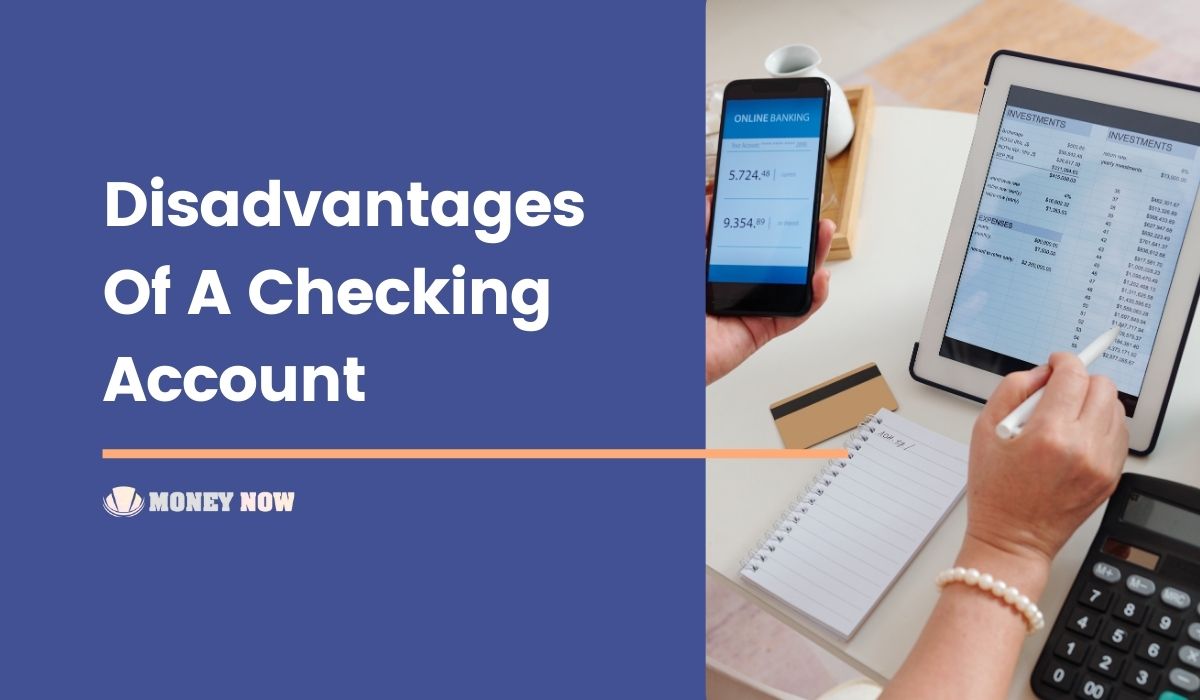
Checking accounts serve as a fundamental component of personal finance management, facilitating easy access to funds for daily transactions. However, they come with certain disadvantages that can impact financial efficiency negatively. This article aims to shed light on the less-discussed disadvantages of a checking account which includes:
Minimal to no interest earnings
Fees and charges
Overdraft penalties
Vulnerability to fraud
Limited investment potential
Encouragement of spending
Account Restrictions
This article explores these disadvantages in detail, offering insights into how they can affect your financial strategy and suggesting ways to navigate these challenges for better financial health.
One of the primary disadvantages of most checking accounts is their minimal to non-existent interest earnings. Unlike savings accounts, which are designed to grow your funds over time, checking accounts typically offer lower interest rates. This means that money kept in a checking account is not working as hard for you, potentially leading to a loss of purchasing power over time due to inflation.
Checking accounts are notorious for their fees. Monthly maintenance fees, ATM fees (for using ATMs outside of your bank’s network), overdraft fees, and non-sufficient funds (NSF) fees can quickly add up, eating into your available balance. While some banks offer ways to waive certain fees, such as maintaining a minimum balance or having direct deposits, these requirements might not be feasible for all account holders.
Overdraft protection might seem like a benefit at first glance, but it can be a double-edged sword. Opting into overdraft protection means that transactions exceeding your account balance will be covered by the bank, but at a steep cost. Overdraft fees are significant, and if not managed carefully, can lead to a cycle of debt, especially if multiple overdrafts occur in a short period.
Checking accounts, especially those with debit cards and online banking capabilities, can be vulnerable to fraud and unauthorized transactions. While federal regulations limit consumer liability for fraudulent transactions, dealing with the aftermath of such incidents can be stressful and time-consuming. Vigilance and regular monitoring of account activity are required to mitigate this risk.
Funds in a checking account are liquid and readily available, which is ideal for daily transactions but not for long-term growth. By keeping too much money in a checking account, you miss out on potential investment opportunities that could offer higher returns. Diversifying your assets beyond a checking account is crucial for building wealth.
The ease of access to funds in a checking account can sometimes encourage impulsive spending. Debit cards, online payments, and mobile banking apps make it all too easy to spend money without much thought, potentially leading to poor financial habits and diminished savings.
Some checking accounts come with restrictions that can be inconvenient for users. These may include limits on the number of transactions per month, minimum balance requirements, or fees for account services like paper statements. Such restrictions can make managing finances more cumbersome, particularly for those who have higher transaction volumes or prefer not to maintain a significant balance in their checking account.
Look for banks that offer fee-free checking accounts, meet the requirements to waive fees, or consider online banks with fewer overhead costs and thus fewer fees.
Online-only banks, credit unions, and digital wallets offer alternatives with lower fees and different features that might better suit your needs.
While not all terms are negotiable, some banks may waive certain fees or offer better conditions if you discuss your needs and how you plan to use your account.
Diversifying your financial portfolio by spreading your funds across checking accounts, savings accounts, and investments is safer and more financially prudent than keeping all your money in a single account.
Regularly reviewing your account, ideally weekly or bi-weekly, helps catch any unauthorized transactions early and keeps you aware of your spending habits and account balance.
While checking accounts offer undeniable convenience for managing day-to-day finances, they are not without their drawbacks. From the erosion of wealth due to low interest rates and fees to the potential for fraud and poor spending habits, there are several factors to consider when using a checking account. By understanding these disadvantages of a checking account, individuals can take steps to mitigate the negative impacts, such as keeping a close eye on account fees, avoiding overdrafts, and considering alternative financial products for saving and investing. Ultimately, a balanced approach to financial management, one that includes but is not solely reliant on a checking account, is key to achieving financial health and growth.
Explore the best savings and investment options tailored to your child's needs and start building a solid foundation today. Invest wisely for a brighter tomorrow!
